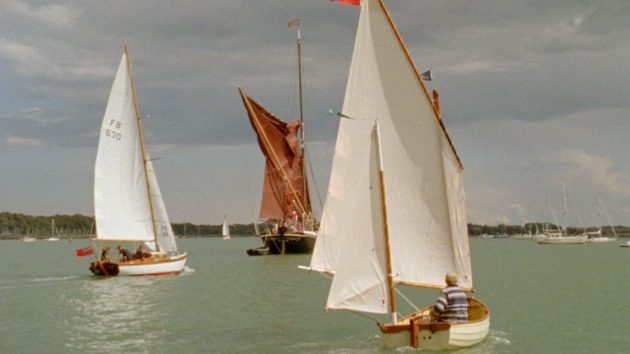Katy Stickland reviews the new film, Wind, Tide & Oar, which explores the experience of engineless sailing and its impact on the sailors who have chosen to sail by the power of nature alone
This is a feast for the eyes and ears: Wind, Tide & Oar gently envelops the viewer into the world of engineless sailing, the romance and the reality of navigating the seas using just the power of the wind and tides.
 Watch the video
Watch the videoFilmmaker Huw Wahl shot the film using 16mm analogue film and a 1960s hand-wound camera, which adds to its nostalgia and visual charm but means the contrast between traditional sailing craft and the crude oil-guzzling cargo ships is all the more stark.
Divided into three parts – The Tide Flows In, The Tide Flows Out and The Turning Tide – the film’s narrative is anchored by Huw’s sister, Rose Ravetz, who sails her own engineless boat, Defiance.

The enginless sailing of Thames barge, Blue Mermaid is contrasted with the cargo ships on the East Coast. Credit: Wind, Tide & Oar/Huw Wahl
What struck me was not only the beauty and craftsmanship of the vessels featured but also the sounds they make. I loved hearing the creaks and groans as sails were hosted, rope running on rings, the sound of the sea as an oar was sculled, the calls of the oystercatchers and the clicks of the dolphins.
Boats of all sizes from Cornwall, the East Coast and The Netherlands were filmed over three years including the Cornish lugger, Guide Me, the Thames sailing barge, Blue Mermaid, the 32m cargo ship, Tres Hombres, and the Falmouth oyster dredger, Katrina.
Each sailor shares what it means to sail in its rawest form – using just the wind, tide or an oar – and why today, with most boats equipped with engines, it is time to rethink and embrace our relationship with nature.
For some, it is the seamanship skills that are required for sailing without an engine.

Falmouth oyster fisherman, Jonathan Bailey has been sailing the creeks for 60 years – all without an engine. Credit: Wind, Tide & Oar/Huw Wahl
Oyster fisherman Jonathan Bailey memorably says: “An awful lot of the skill isn’t not making mistakes, because you always will because you are dealing with so many variables, but it is knowing how to unpick it when you have made the mistake. This is what it teaches you, doing it without an engine.”
And he is right: we have no control over the weather and its impact on our voyage, less so if you have no engine onboard. You have to communicate with nature and respond to Mother Nature’s foibles and often, this means accepting a slower pace.
Throughout Wind, Tide & Oar there is a seam of slowing down; as the viewer, you absorb the atmosphere and the sensory life at sea of the crews, and it is a real treat.
It also questions why, after thousands of years of sail, we have turned our back on this eco-friendly mode of transport, instead relying on engines to transport goods around the world.
This is in no way a film that preaches but instead contemplates the environmental and human cost of the shipping industry.

The film is beautifully and sensitively shot. Credit: Wind, Tide & Oar/Huw Wahl
But overall, it delves into what it truly means to sail, to be at one with the boat and the elements, which EcoClipper’s Jorne Langelaan sums up beautifully.
“The true sense of sailing, the true sense of seamanship is also being aware of the surroundings, being aware of the weather. A Master Mariner on a sailing ship is more like a Wind Wizard, like a Weather Wizard. The main thing a Master Mariner on a sailing ship is doing is working with the weather and working with the tides; visualising the future of the weather. What is going to happen? What do I see in those clouds? What do I see in that sea state? What is happening with the barometer? And that is a way different way of sailing and brings you really, really close to nature. It is natural sailing.”
Wind, Tide & Oar is an evocative exploration of engineless sailing not to be missed!
Wind, Tide & Oar is available to see at special screenings along the South East coast aboard the Thames Sailing Barge, Blue Mermaid. Tickets can be bought here: www.windtideandoar.com/sea-tour
From July, it will be screened across the UK and beyond at cinemas, film festivals, local sailing clubs and exhibitions. Details here: www.windtideandoar.com/land-tour
From 2 July to 10 August, Wind, Tide & Oar will be showing three times a day at the CAST art gallery in Helson, Cornwall. Rose and Huw will also be giving a talk at a special evening screening on 11 July.
More details at: www.castcornwall.art




